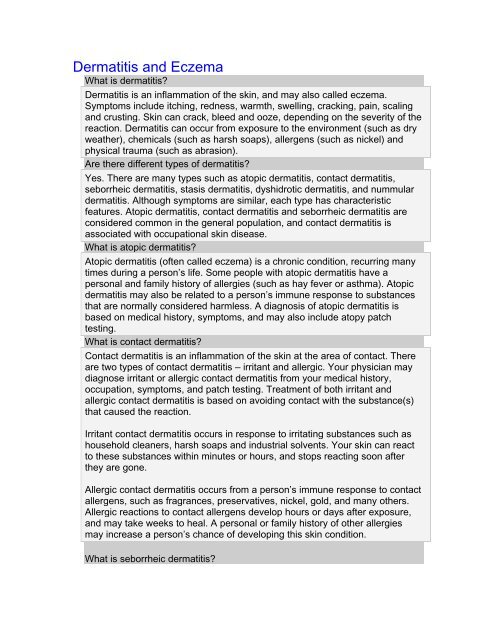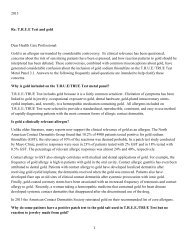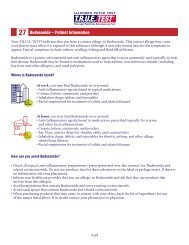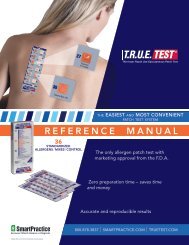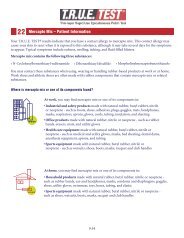Dermatitis and Eczema - T.R.U.E. Test
Dermatitis and Eczema - T.R.U.E. Test
Dermatitis and Eczema - T.R.U.E. Test
You also want an ePaper? Increase the reach of your titles
YUMPU automatically turns print PDFs into web optimized ePapers that Google loves.
<strong>Dermatitis</strong> <strong>and</strong> <strong>Eczema</strong><br />
What is dermatitis<br />
<strong>Dermatitis</strong> is an inflammation of the skin, <strong>and</strong> may also called eczema.<br />
Symptoms include itching, redness, warmth, swelling, cracking, pain, scaling<br />
<strong>and</strong> crusting. Skin can crack, bleed <strong>and</strong> ooze, depending on the severity of the<br />
reaction. <strong>Dermatitis</strong> can occur from exposure to the environment (such as dry<br />
weather), chemicals (such as harsh soaps), allergens (such as nickel) <strong>and</strong><br />
physical trauma (such as abrasion).<br />
Are there different types of dermatitis<br />
Yes. There are many types such as atopic dermatitis, contact dermatitis,<br />
seborrheic dermatitis, stasis dermatitis, dyshidrotic dermatitis, <strong>and</strong> nummular<br />
dermatitis. Although symptoms are similar, each type has characteristic<br />
features. Atopic dermatitis, contact dermatitis <strong>and</strong> seborrheic dermatitis are<br />
considered common in the general population, <strong>and</strong> contact dermatitis is<br />
associated with occupational skin disease.<br />
What is atopic dermatitis<br />
Atopic dermatitis (often called eczema) is a chronic condition, recurring many<br />
times during a person’s life. Some people with atopic dermatitis have a<br />
personal <strong>and</strong> family history of allergies (such as hay fever or asthma). Atopic<br />
dermatitis may also be related to a person’s immune response to substances<br />
that are normally considered harmless. A diagnosis of atopic dermatitis is<br />
based on medical history, symptoms, <strong>and</strong> may also include atopy patch<br />
testing.<br />
What is contact dermatitis<br />
Contact dermatitis is an inflammation of the skin at the area of contact. There<br />
are two types of contact dermatitis – irritant <strong>and</strong> allergic. Your physician may<br />
diagnose irritant or allergic contact dermatitis from your medical history,<br />
occupation, symptoms, <strong>and</strong> patch testing. Treatment of both irritant <strong>and</strong><br />
allergic contact dermatitis is based on avoiding contact with the substance(s)<br />
that caused the reaction.<br />
Irritant contact dermatitis occurs in response to irritating substances such as<br />
household cleaners, harsh soaps <strong>and</strong> industrial solvents. Your skin can react<br />
to these substances within minutes or hours, <strong>and</strong> stops reacting soon after<br />
they are gone.<br />
Allergic contact dermatitis occurs from a person’s immune response to contact<br />
allergens, such as fragrances, preservatives, nickel, gold, <strong>and</strong> many others.<br />
Allergic reactions to contact allergens develop hours or days after exposure,<br />
<strong>and</strong> may take weeks to heal. A personal or family history of other allergies<br />
may increase a person’s chance of developing this skin condition.<br />
What is seborrheic dermatitis
Seborrheic dermatitis is usually associated with red <strong>and</strong> flaking patches of<br />
skin. It is often found on the scalp ( d<strong>and</strong>ruff ), as well as the nose, eyebrows,<br />
ears, <strong>and</strong> chest where hair follicles occur. Seborrheic dermatitis may be<br />
associated with an unusual immune reaction to a fungal infection. It can occur<br />
in healthy infants, children <strong>and</strong> adults, as well as patients with compromised<br />
immune systems. Infections, dry weather, oily skin, stress <strong>and</strong> other factors<br />
can make seborrheic dermatitis worse.<br />
Can I tell what type of dermatitis I have<br />
No. <strong>Dermatitis</strong> symptoms such as redness, itching, warmth, swelling, scaling,<br />
cracking or pain are common <strong>and</strong> not specific. Your doctor will probably use<br />
your symptoms, medical <strong>and</strong> occupational history, <strong>and</strong> specific testing to<br />
determine what type of dermatitis you have.<br />
How can I help my doctor diagnose my skin condition<br />
Keep a “diary” of when your symptoms appear, get worse or improve. It also<br />
helps to write down where your symptoms occur on your body, <strong>and</strong> how long<br />
they last. If you notice that your skin gets worse after certain activities, record<br />
the reaction <strong>and</strong> the activity in as much detail as possible.<br />
Workers in some occupations are more likely to develop allergic contact<br />
dermatitis, so it’s important to describe your work to your doctor. If you h<strong>and</strong>le<br />
chemicals during the day, make a list of these or find their Material Safety<br />
Data Sheets (MSDS).<br />
How is dermatitis treated<br />
Successful treatment of dermatitis symptoms depends on getting an accurate<br />
diagnosis from your physician. Depending on the type of dermatitis <strong>and</strong> the<br />
severity of skin reactions, a physician may prescribe corticosteroids, antifungal<br />
agents, antihistamines, barrier creams, <strong>and</strong> moisturizers for your skin,<br />
shampoos with salicylic acid, selenium, zinc, or coal tar, <strong>and</strong> oral medications.<br />
These treatments are intended to treat your symptoms <strong>and</strong> improve your<br />
skin’s condition.<br />
Because there is often no cure for dermatitis, your physician should discuss<br />
ways to avoid allergen <strong>and</strong>/or irritant contact, <strong>and</strong> how to take better care of<br />
your skin. In addition, reducing stress can improve your immune system<br />
response <strong>and</strong> help restore your skin’s normal integrity [Choi et al, 2005].<br />
These general guidelines are intended for educational purposes only. Please<br />
consult your physician for specific questions about skin care.<br />
For more information about contact allergies or<br />
patch testing, visit www.truetest.com


